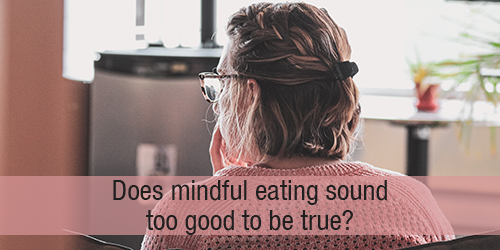Just last week, two people in two different Coaching Groups told me they hadn’t binged in months since using our mindful eating approach. Both said they wouldn’t have believed it was possible. And therein lies the problem… many of the people we can help the most think mindful eating won’t help them. If you’re afraid mindful eating won’t work for you, read on…
Mindful eating isn’t for everyone
It’s important to acknowledge up front that mindful eating isn’t for everyone. And that’s OK. The way I see it…
- If you already have a great relationship with food, meaning you don’t struggle with why, when, what, and how much you eat, you may not need mindful eating. (Though many people THINK they don’t have issues with food because our culture’s approach to food is so messed up that their behaviors seem pretty “normal”!)
- If you’re not ready to look beyond the scale to understand why you do what you do (instead of trying harder to do what you’ve always done), then this may not be the right time for you.
- If you feel you must try one more diet first, then maybe you should. Just keep in mind how many other times you thought, “This will be it!”
Will mindful eating work for you?
 Maybe you’re hesitating to try mindful eating because although it sounds great, you are afraid that mindful eating won’t work for you. The truth is, I can’t guarantee that it will.
Maybe you’re hesitating to try mindful eating because although it sounds great, you are afraid that mindful eating won’t work for you. The truth is, I can’t guarantee that it will.
But, if you don’t give yourself the opportunity to look at eating in an entirely new way, I guarantee it won’t! And year after year, you’ll probably find yourself continuing to struggle with the same eating challenges (at least that’s what I did).
Your fears and doubts
What are some of the fears and doubts you have about learning to manage your eating mindfully – without restriction, deprivation, or guilt? In other words, can you really learn to eat joyfully, fearlessly, mindfully, and with the intention of fueling the big, vibrant life you crave?
1. If I give up logging food, I’m afraid I’ll lose control!
You won’t lose control, but you’ll happily give up control because you’ll learn to be in charge instead.
You see, being in control is about holding on tight, obsessing, worrying, thinking about food (or not eating food) all the time, and using too much of your attention and energy on something that should be completely natural and nearly effortless!
This may not be true of other mindful eating programs, but in Am I Hungry? one of the key lessons you’ll learn is how to be in charge instead of trying to stay in control all the time. What’s the difference? Being in charge means you make conscious decisions based on what’s right for you in the present moment. You don’t have to look food up and write food down. You don’t need to know ahead of time what’s on the menu or decide what you’re going to eat for dinner before you even have breakfast. It means you can eat birthday cake without saving up—or denying yourself afterward.
I know that might sound impossible or even scary, and I don’t blame you for feeling afraid. “They’ve” taught you that you need rules. And you’ve proved “they” were right by losing control. But what “they” didn’t tell you (or maybe don’t even know!) is that one of the major reasons you lose control is because of all those rules!
Try this: Every time you feel like eating, pause to notice whether you are hungry. Can you tell? What symptoms do you have? How hungry are you? (Use the Hunger and Fullness scale I taught you about in this video.) If you aren’t hungry, do you know why you feel like eating? Do you know what to do?
Am I Hungry? Mindful Eating Programs will give you answers to all these questions and much, much more!
And I promise: You’ll relearn how to use your natural signals of hunger and satiety to guide your eating—and what to do when you want to eat when you aren’t hungry!
2. Sometimes I feel like I’m addicted to food!
I get it! During my 20+ years of yo-yo dieting, I felt like I was addicted to food too!
When I’d finally give in and eat the foods I was craving but wasn’t supposed to have, it was SO hard to stop eating them.
Of course it was! I kept telling myself, I shouldn’t be eating this! I won’t eat this again! I’ve already blown it, so I might as well eat it all and start over tomorrow! Of course I felt powerless!
It’s not like that anymore! I can eat what I love without fear of losing control. And you can too!
Our strategies for “Fearless Eating” shows you how to eat what you love without guilt. We’ll learn how to make decisions about eating no matter where you are or what is happening. (Be sure to watch this video for 3 questions to ask yourself.) You’ll learn how to balance eating for health with eating for pleasure. We work on your specific health goals and much, much more!
Try this: Notice how often you:
- think of foods as good or bad (whether you eat them or not).
- avoid (or try to avoid) something you really, really want.
- feel like you are “out of control.”
- you are thinking about food even when you’re not hungry.
Stop “white-knuckling it” because you’re afraid of losing control around certain foods (sugar, bread, chips, pizza, and on and on). It doesn’t have to be like that… unless you prefer to hold onto that fear instead of trusting there might be another option.
3. I eat my emotions.
Lots of people do! In fact, emotional eating is a normal part of human behavior.
The problem comes when you aren’t able to interpret your emotions and meet your true needs. When you eat instead of dealing with whatever caused the urge, you are missing an opportunity to take care of yourself. No wonder you don’t feel your best! And no wonder the urge to eat keeps coming back! (Did you see my video about the two buckets?)
One of the most important steps in healing your relationship with food is learning how to identify, name, manage, and decode your emotions. In Am I Hungry? Mindful Eating Programs we explore your specific triggers for eating and how to meet your real needs better than food ever could.
Try this: Notice when you feel like eating but you aren’t hungry—or feel like continuing to eat past the point of comfort. Do you know why? What might you need instead of food?
Many of us didn’t learn the language of emotions in childhood. Instead, we learned to power through, pretend everything was fine, then eat in secret. You deserve better than that!
4. It sounds too good to be true.
If I hadn’t been living a vibrant life free of the eat-repeat-repent cycle for more than two decades, I might not believe it was possible either!
And if I hadn’t taught thousands of others how to free themselves and live their vibrant lives, I might not be so passionate about teaching you how to do it too!
Diet culture pretends that going on one diet after another and calling it a lifestyle change is sustainable. The research has shown that a restrictive approach to eating doesn’t work for long for almost anyone.
Am I Hungry? Mindful Eating Programs we explore the behaviors that support your optimal well-being and peel back the layers on how lasting change takes place. We’ll strengthen your self-care voice and give you an inside-out approach to caring for you body, mind, heart, and spirit.
I’m not saying it’s easy. You’ve practiced your old habits for decades, so the underlying causes are now mostly invisible to you.
But with an experienced guide to help you uncover your outdated beliefs and teach you new ways to think, feel, and act, you will be amazed at how you can replace eating with living your vibrant life.
Try this: Notice your self-talk. What are you whispering to yourself about your appearance, your eating, your physical activity, and your worthiness? How do these thoughts make you feel? Are they helping or hurting you?
Here’s what Alessia said about her break-throughs:
What I have most appreciated about mindful eating group coaching is the discovery that I am not alone in dealing with my problems with food. In other people I found a piece of myself. Their story was partly mine too. And in their sharing, I could understand patterns with food I had been carrying for a lifetime. Listening to other people has helped me to be more human, more loving and compassionate, able to accept their vulnerability and mine, to love that part that is struggling but which is trying hard to heal and make peace. All under the attentive, patient, loving and wise presence of Michelle who helps us find the most functional answers and strategies for each of us.
This article has been updated from a previously published version.
If you enjoyed this article, here are three more to help you:
How Long Does It Take to Learn to Eat Mindfully?
I can’t eat what I love without overeating!

